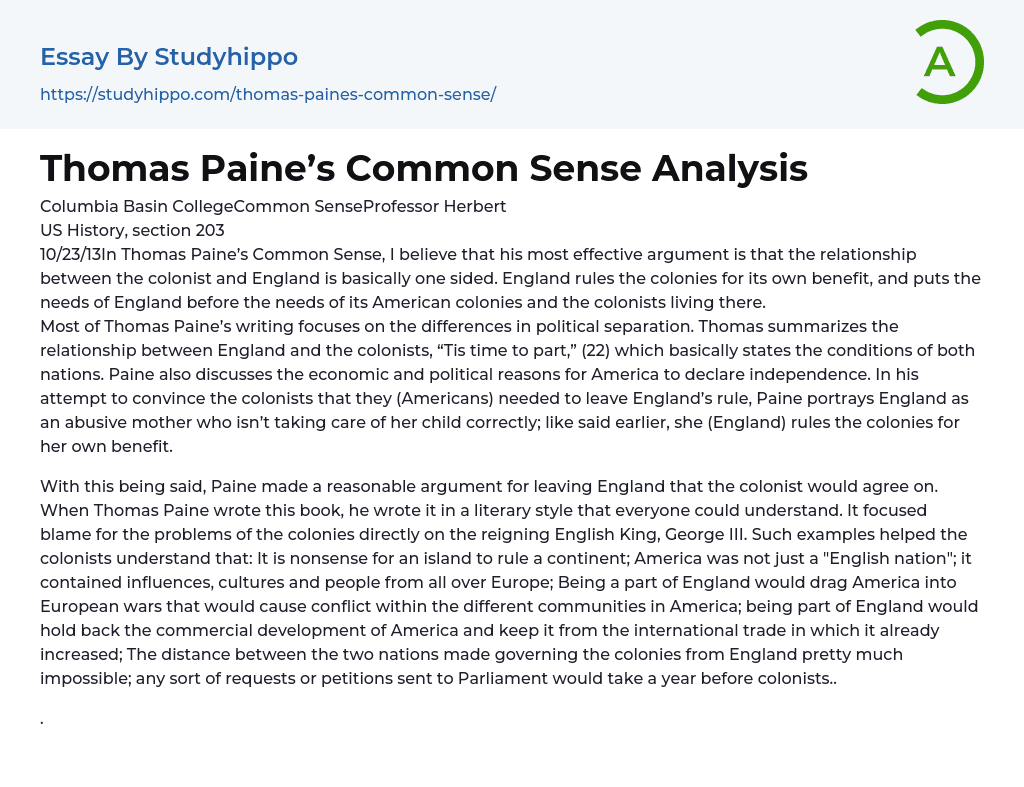In Thomas Paine’s Common Sense, I believe that his most effective argument is that the relationship between the colonist and England is basically one sided. England rules the colonies for its own benefit, and puts the needs of England before the needs of its American colonies and the colonists living there.
Most of Thomas Paine’s writing focuses on the differences in political separation. Thomas summarizes the relationship between England and the colonists, “Tis time to part,” which basically states the conditions of both nations. Paine also discusses the economic and political reasons for America to declare independence. In his attempt to convince the colonists that they (Americans) needed to leave England’s rule, Paine portrays England as an abusive mother who isn’t taking care of her child correctly; like said earlier, she (England) rules the colonies for her own benefit.
With
...this being said, Paine made a reasonable argument for leaving England that the colonist would agree on. When Thomas Paine wrote this book, he wrote it in a literary style that everyone could understand. It focused blame for the problems of the colonies directly on the reigning English King, George III. Such examples helped the colonists understand that:
- It is nonsense for an island to rule a continent;
- America was not just a "English nation";
- it contained influences, cultures and people from all over Europe;
- Being a part of England would drag America into European wars that would cause conflict within the different communities in America;
- being part of England would hold back the commercial development of America and keep it from the international trade in which it already increased;
- The distance between the two nations made
governing the colonies from England pretty much impossible; any sort of requests or petitions sent to Parliament would take a year before colonists.
.
- Values of Life essays
- Ethical dilemma essays
- Normative Ethics essays
- Virtue Ethics essays
- Belief essays
- Deontology essays
- Moral essays
- Virtue essays
- Work Ethic essays
- Common sense essays
- Acceptance essays
- Age Of Enlightenment essays
- Child Observation essays
- Confucianism essays
- Conscience essays
- Critical Reflection essays
- Destiny essays
- Determinism essays
- Empiricism essays
- Environmentalism essays
- Epistemology essays
- Ethics essays
- Ethos essays
- Existence essays
- Existentialism essays
- Fate essays
- Free Will essays
- Functionalism essays
- Future essays
- Good And Evil essays
- Human Nature essays
- Individualism essays
- Meaning Of Life essays
- Metaphysics essays
- Natural Law essays
- Personal Philosophy essays
- Philosophers essays
- Philosophy Of Life essays
- Political Philosophy essays
- Pragmatism essays
- Reality essays
- Relativism essays
- Teaching Philosophy essays
- Time essays
- Transcendentalism essays
- Truth essays
- Utilitarianism essays
- Aldous Huxley essays
- Alice Walker essays
- Amy tan essays




